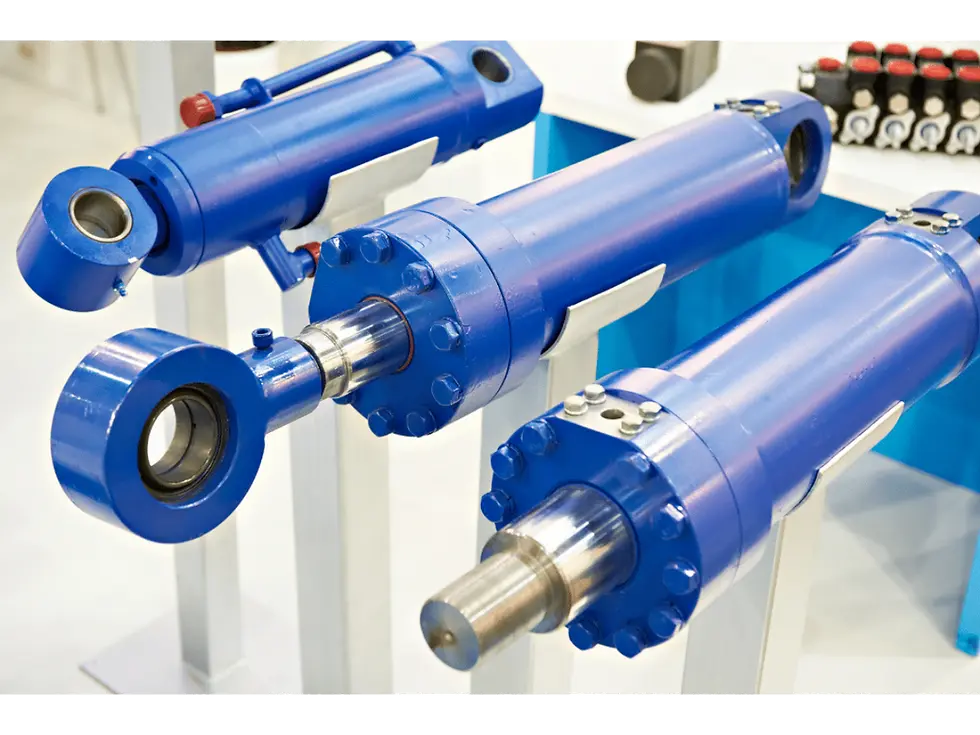Common Ways Hydraulic Cylinders Fail and Effective Strategies to Prevent Them
- Hydra-Spares

- Dec 17, 2024
- 3 min read
Hydraulic cylinders are critical components in many industrial, agricultural, and construction systems, providing the force needed for lifting, pushing, and pulling. Despite their robust design, hydraulic cylinders are susceptible to failure if not properly maintained or used. Understanding the common causes of failure and implementing effective preventative measures can significantly extend the life of your hydraulic systems. In this article, we explore the most common ways hydraulic cylinders fail and how to prevent these issues.

1. Seal FailureCause:
Hydraulic seals are essential for preventing fluid leaks and maintaining system pressure. However, seals can fail due to wear and tear, contamination, extreme temperatures, or improper installation.
Prevention:
Use high-quality seals appropriate for your application.
Regularly inspect seals for wear or damage.
Keep the hydraulic fluid clean to avoid contamination.
Ensure correct installation and avoid over-tightening, which can cause premature damage.
2. Contaminated Hydraulic FluidCause:
Contaminants such as dirt, water, and metal particles in the hydraulic fluid can cause significant damage to the cylinder, leading to abrasion, corrosion, and reduced efficiency.
Prevention:
Regularly monitor and change hydraulic fluid according to the manufacturer’s recommendations.
Use high-quality filters to remove contaminants.
Keep the hydraulic system sealed and clean during repairs or refills.
3. Rod BendingCause:
Hydraulic cylinder rods can bend under excessive loads, improper alignment, or side loading. This compromises the cylinder’s performance and can cause further damage to seals and internal components.
Prevention:
Ensure the cylinder is correctly aligned with the load.
Avoid overloading the system beyond its design specifications.
Use guide systems to reduce side loading on the rod.
4. CorrosionCause:
Corrosion occurs when hydraulic cylinders are exposed to moisture, chemicals, or corrosive environments, leading to pitting and surface damage on the cylinder rod.
Prevention:
Use corrosion-resistant materials or coatings, such as chrome-plated rods.
Apply protective covers or boots in harsh environments.
Store equipment indoors when not in use to minimise exposure to moisture.
5. Piston WearCause:
Continuous operation, contamination, or improper lubrication can cause the piston to wear, leading to reduced efficiency and fluid bypass.
Prevention:
Maintain clean hydraulic fluid to reduce abrasion.
Use the correct fluid type to ensure proper lubrication.
Schedule routine inspections and replace worn pistons promptly.
6. OverheatingCause:
Hydraulic systems can overheat when operating under high pressure for extended periods or when fluid levels are low. Overheating damages seals, rods, and other components.
Prevention:
Monitor system temperature and avoid overloading.
Use cooling systems such as heat exchangers or coolers.
Ensure adequate fluid levels to maintain proper system operation.
7. Cylinder MisalignmentCause:
Misalignment between the hydraulic cylinder and its load can cause uneven wear, bending, and premature failure.
Prevention:
Regularly check alignment during installation and operation.
Use clevis mounts or spherical bearings to allow flexibility and proper alignment.
Avoid operating equipment with bent rods or improperly mounted cylinders.
8. Improper MaintenanceCause:
Neglecting routine maintenance can allow small issues to escalate into costly failures.
Prevention:
Follow a structured maintenance schedule, including inspections, fluid changes, and component replacements.
Train operators to recognise early warning signs such as leaks, unusual noises, or performance drops.
Document maintenance activities for better system management.
Hydraulic cylinder failure can result in costly downtime and repairs, impacting productivity and operations. By understanding the common causes of failure, such as seal wear, contamination, rod bending, and overheating, you can take proactive steps to prevent them. At Hydra-Spares, we provide high-quality hydraulic components, expert advice, and maintenance solutions to ensure your systems perform reliably and efficiently.
Trust Hydra-Spares to keep your hydraulics running smoothly – because prevention is always better than repair.




Comments